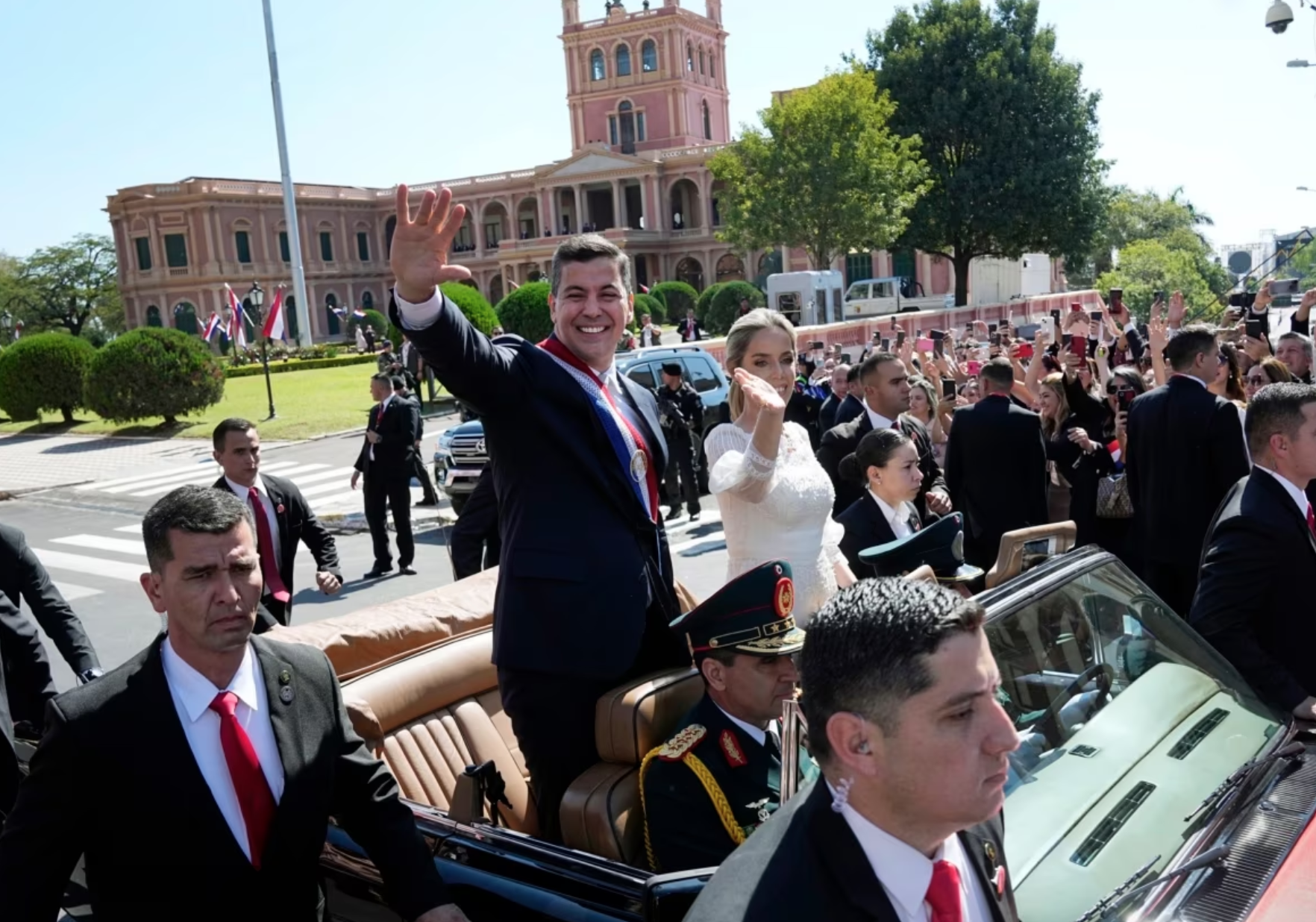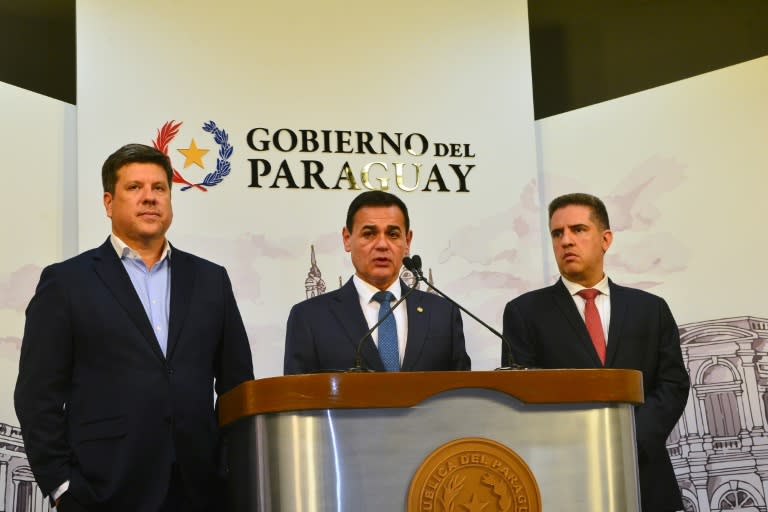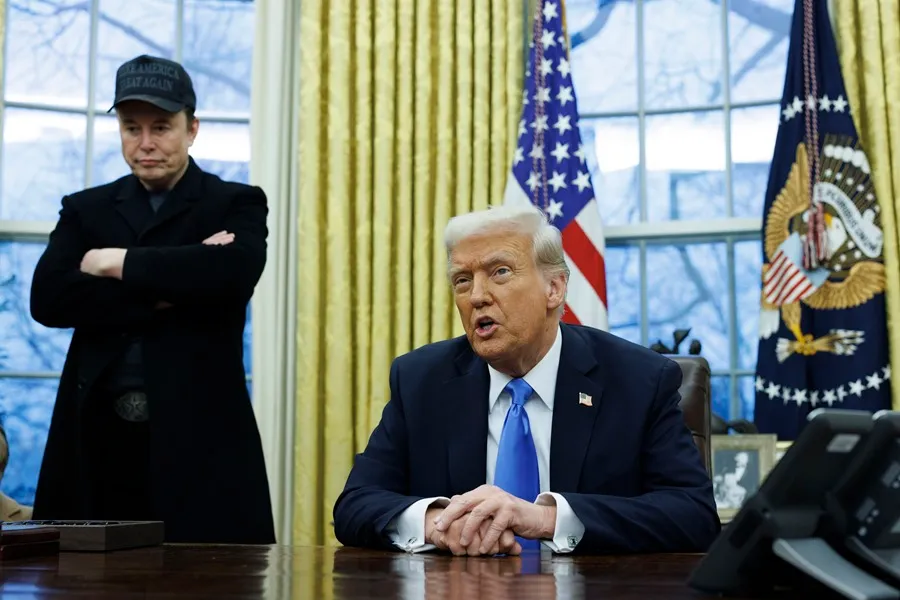International
Santiago Peña takes office as president of Paraguay, promises prosperity and international presence

August 16|
Economist Santiago Peña took office on Tuesday as Paraguay’s new president with a promise to promote prosperity for all in his country and lead the South American nation to become a protagonist on the international scene.
Peña, 44, became the youngest president since the return to democracy and maintains the continuity in power of the conservative Colorado Party in Paraguay, a country that has faced allegations of corruption in the spheres of power and is the last South American nation to maintain diplomatic relations with Taiwan.
“Success is to make all Paraguayans better off and for the world to witness the resurgence of a giant,” the new president said at a ceremony in the Paraguayan capital.
The inauguration ceremony was attended by leaders from neighboring countries, including Luis Inácio Lula da Silva of Brazil, Alberto Fernández of Argentina and Gabriel Boric of Chile, to whom he said he will seek to make Paraguay a key country for South American integration, and will therefore seek to improve the functioning of the Mercosur sub-regional bloc.
The ceremony was also attended by the King of Spain, Felipe VI, and the Vice President of Taiwan, William Lai, who traveled to Paraguay as part of a tour that will also take him to San Francisco and New York, at a time when China is seeking to increase the isolation of the autonomous island.
Regarding Taiwan, Peña said that their relationship is a sign of Paraguay’s policy of “alliances and cooperation with a geostrategic vision”.
Paraguay is one of 12 countries that still maintain diplomatic relations with Taiwan, mostly small and poor nations in Africa and the Caribbean.
“At the international level three global challenges generate geopolitical tensions: access to water, food security and energy sufficiency,” he said. “Paraguay being a power in those three major issues, we are called to be protagonists in the concert of nations.”
On the local level, he noted that his commitment is to “build a society where everyone can prosper,” he said, and pledged to generate at least 500,000 new jobs. In Paraguay, poverty reaches 24% of the little more than seven million inhabitants.
Peña is a US-trained economist who worked for the International Monetary Fund.
In recent months, the issue of corruption in power circles has shaken the South American country. The United States accused former president Horario Cartes (2013-2018) of corruption and froze his assets. Cartes, considered Peña’s political “godfather”, owns a conglomerate of companies ranging from tobacco to cattle ranching and large media outlets, and has denied the charges.
In his speech as new president, Peña thanked Cartes, current president of the Colorado Party, for what he called his perseverance “in building consensus and seeking agreements over differences”.
On corruption, Peña said he had “the conviction” that it is solved “with an independent, impartial and fast justice, with sufficient resources to ensure an adequate and homogeneous administration throughout the national territory”.
International
Paraguay summons Brazilian ambassador over Itaipú espionage scandal

Paraguay summoned the Brazilian ambassador in Asunción on Tuesday to demand “explanations” and called its own representative in Brasília for consultations following Brazil’s acknowledgment of an espionage operation. The Brazilian government, led by President Luiz Inácio Lula da Silva, attributed the operation to the previous administration.
The surveillance effort aimed to uncover Paraguay’s position in now-suspended negotiations with Brazil regarding the pricing of electricity from the binational Itaipú hydroelectric plant, according to reports in the Brazilian press.
The Brazilian government “categorically denied any involvement in the intelligence operation,” stating in a Foreign Ministry communiqué on Monday that the espionage was carried out under former President Jair Bolsonaro’s administration (2019-2023).
“The operation was authorized by the previous government in June 2022 and was annulled by the interim director of the (state intelligence agency) ABIN on March 27, 2023, as soon as the current administration became aware of it,” Brazil’s government asserted.
Paraguay’s Foreign Minister Rubén Ramírez announced that Brazilian Ambassador José Antonio Marcondes de Carvalho was summoned “to provide detailed explanations” regarding the operation. Additionally, Paraguay recalled its diplomatic representative in Brasília “to report on aspects related to the intelligence activity conducted by Brazil regarding Paraguay’s government affairs.”
International
Elon Musk to step down as government advisor, per Trump insiders

President Donald Trump has informed his inner circle that Elon Musk will be stepping down from his role as a government advisor, according to a report by Politico today.
Citing three individuals close to Trump, Politico states that the president is pleased with Musk’s leadership at the Department of Government Efficiency (DOGE), where he has implemented significant budget cuts. However, both have agreed that it is time for Musk to return to his businesses and support Trump from a different position outside the government.
A senior administration official told Politico that Musk will likely maintain an informal advisory role and continue to be an occasional visitor to the White House. Another source warned that anyone thinking Musk will completely disappear from Trump’s circle is “deluding themselves.”
According to the sources, this transition is expected to coincide with the end of Musk’s tenure as a “special government employee,” a temporary status that exempts him from certain ethics and conflict-of-interest regulations. This 130-day period is set to expire in late May or early June.
International
Milei vows to make Argentina so strong that Falkland Islanders “choose” to join

Argentine President Javier Milei reaffirmed his country’s claim over the Falkland Islands (known as the Islas Malvinas in Argentina) and praised the role of the nation’s armed forces during a ceremony marking the “Veterans and Fallen Soldiers of the Malvinas War Day,” commemorating 43 years since the 1982 conflict with the United Kingdom.
Argentina continues to assert sovereignty over the islands, arguing that Britain unlawfully seized them in 1833.
“If sovereignty over the Malvinas is the issue, we have always made it clear that the most important vote is the one cast with one’s feet. We hope that one day, the Malvinas residents will choose to vote with their feet and join us,” Milei stated.
“That is why we aim to become a global power—so much so that they would prefer to be Argentine, making deterrence or persuasion unnecessary. This is why we have embarked on a path of liberation, working to make Argentina the freest country in the world and once again the nation with the highest GDP per capita on the planet,” he added.
-

 Central America3 days ago
Central America3 days agoU.S. Homeland Security Secretary urges Mexico to strengthen Guatemala border
-

 Central America3 days ago
Central America3 days agoPanama grants Martinelli 72-hour extension to travel to Nicaragua
-

 International2 days ago
International2 days agoParaguay summons Brazilian ambassador over Itaipú espionage scandal
-

 Central America4 days ago
Central America4 days agoPanama police clarifies that Interpol alert for Martinelli is still pending
-

 International3 days ago
International3 days agoTrump urges Putin to reach peace deal
-

 International4 days ago
International4 days agoDeportation flight lands in Venezuela; government denies criminal gang links
-

 Sports2 days ago
Sports2 days agoFilipe Luis debuts as coach in Copa Libertadores with Flamengo
-

 Central America2 days ago
Central America2 days agoGuatemalan police officer killed in mob riots over baby kidnapping
-

 International2 days ago
International2 days agoElon Musk to step down as government advisor, per Trump insiders
-

 Sports2 days ago
Sports2 days agoVenezuela investigates 18 baseball players seeking asylum in Spain
-

 International2 days ago
International2 days agoMilei vows to make Argentina so strong that Falkland Islanders “choose” to join
-

 International2 days ago
International2 days agoICE agent’s arrest of suspect sparks controversy in Boston
-

 International2 days ago
International2 days agoÓscar Arias: Trump’s trade policies are a step backward















